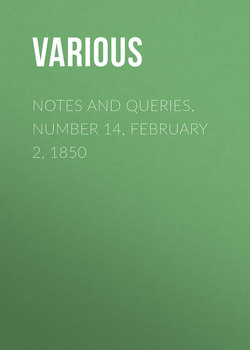Читать книгу Notes and Queries, Number 14, February 2, 1850 - Various - Страница 3
NOTES
LINES ATTRIBUTED TO HUDIBRAS
ОглавлениеPerhaps the following extract from a volume entitled The Relics of Literature, published by Boys and Co., Ludgate Hill, 1820, may prove interesting, as further illustrating the so frequently disputed passage which forms the subject matter of your first article in No. 12.:—
"Few popular quotations have more engaged the pens of critics than the following:—
'For he that fights and runs away
Will live to fight another day.'
"These lines are almost universally supposed to form a part of Hudibras; and, so confident have even scholars been on the subject, that in 1784 a wager was made at Bootle's, of twenty to one, that they were to be found in that inimitable poem. Dodsley was referred to as the arbitrator, when he ridiculed the idea of consulting him on the subject, saying, 'Every fool knows they are in Hudibras.' George Selwyn, who was present, said to Dodsley, 'Pray, sir, will you be good enough, then, to inform an old fool, who is at the same time your wise worship's very humble servant, in what canto they are to be found?' Dodsley took down the volume, but he could not find the passage; the next day came, with no better success; and the sage bibliopole was obliged to confess, 'that a man might be ignorant of the author of this well-known couplet without being absolutely a fool.'"
I have also the following memorandum in a common-place book of mine, but I do not remember from what source I transcribed it many years past:—
"The couplet, thus erroneously ascribed to the author of Hudibras, occurs in a small volume of Miscellaneous Poems, by Sir John Mennis, written in the reign of Charles the Second, which has now become extremely scarce. The original of the couplet may, however, be traced to much higher authority, even to Demosthenes, who has the following expression:—
'[Greek: Anaer ho pheugon kai palin machaesetai]',
of which the lines are almost a literal translation."
While on the subject of quotations, let me ask whether any of your correspondents can tell me where the passage, "Providence tempers the wind to the shorn lamb," is to be found?
Among a few of the many floating quotable passages universally known, without any trace of the authors, among general readers and writers, are the following:—
"When wild in woods the noble savage ran."
DRYDEN's Conquest of Grenada.
"And whistled as he went for want of thought."
DRYDEN's Cymon and Iphigenia.
"Great wits are sure to madness near allied,
And thin partitions do their bounds divide."
DRYDEN's Absalom and Achitophel, st. i. I. 163.
"The tenth transmitter of a foolish face."
SAVAGE.
"When Greek meets Greek then comes the tug of war."
NAT. LEE.
The real line in Lee is—
"When Greeks join Greeks then was the tug of war."
LEE's Alexander the Great.
J.W.G. GUTCH
I wish to ask a few questions, referring to these lines, if you do not think the subject already exhausted by Mr. Rimbault's curious and interesting communication.
1. Does not the entire quotation run somewhat thus:—
"For he that fights and runs away
May live to fight another day;
But he that is in battle slain
Can never hope to fight again"?
2. Are the two last lines in the Musarum Deliciæ?
3. May not the idea suggesting the two first lines be traced to some passage in one of the orations of Demosthenes, and, PAST him, to the "[Greek: Anaer ho pheugon kai palin machaesetai]" of some contemporary, if not still older writer?
4. Whose Apothegems [qy., those of Demosthenes?] are under consideration on folio 239., from which Mr. Rimbault quotes?
Queries 1, 2, 3 have long stood in MS. in my note-book, and I should much like to see them in print, while the subject to which they refer is still fresh in the minds of your readers.
MELANION
The lines—
"For he that fights and runs away
May live to fight another day,"
resemble the following quatrain in the Satyre Menippée, being one of the several verses appended to the tapestry on which was wrought the battle of Senlis:—
"Souvent celuy qui demeure
Est cause de son meschef;
Celuy qui fuit de bonne heure
Peut combattre de rechef."
A.J.H.
